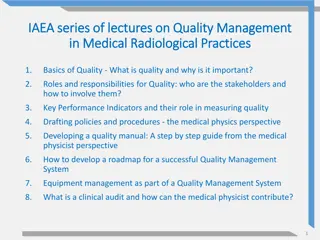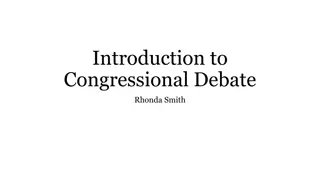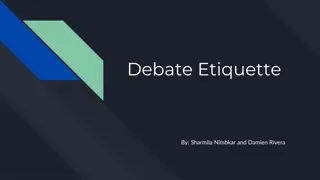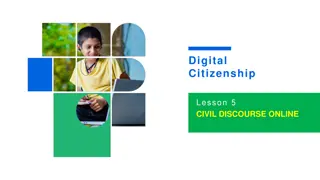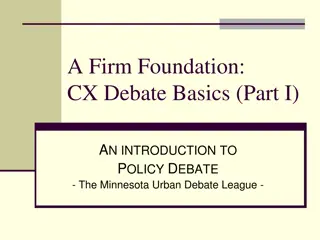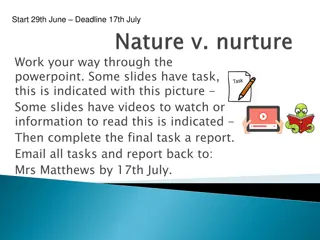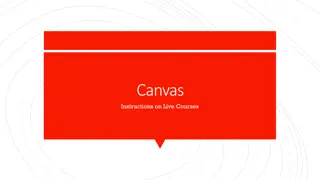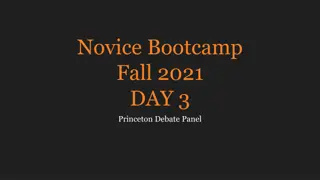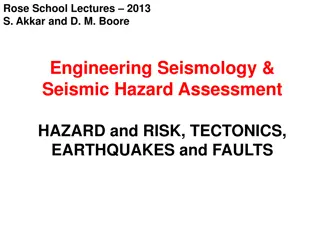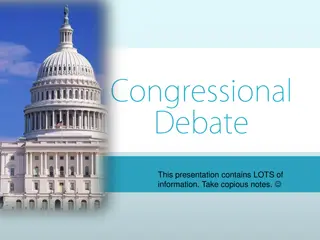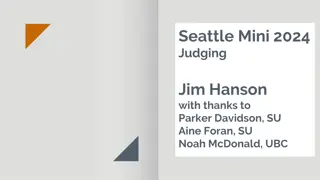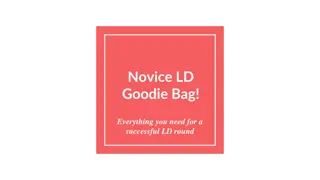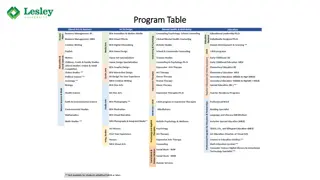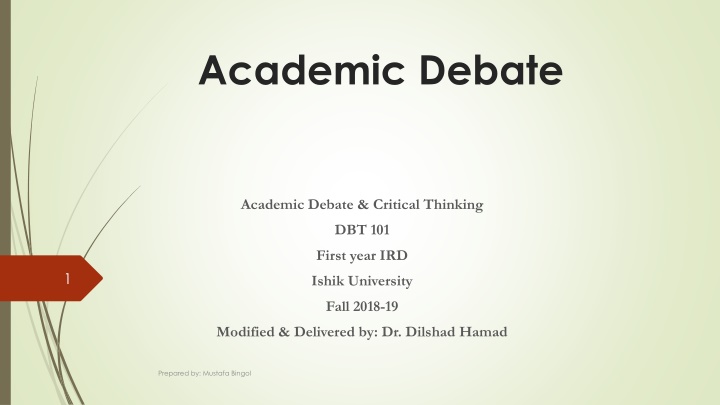
Academic Debate and Critical Thinking: Fundamentals and Benefits
Explore the fundamentals of academic debate and critical thinking, including types of debates, rules, and reasons to engage in debates. Enhance argumentation skills, social abilities, and academic confidence through structured discourse. This comprehensive guide delves into the essence of debate in educational institutions and beyond.
Download Presentation

Please find below an Image/Link to download the presentation.
The content on the website is provided AS IS for your information and personal use only. It may not be sold, licensed, or shared on other websites without obtaining consent from the author. If you encounter any issues during the download, it is possible that the publisher has removed the file from their server.
You are allowed to download the files provided on this website for personal or commercial use, subject to the condition that they are used lawfully. All files are the property of their respective owners.
The content on the website is provided AS IS for your information and personal use only. It may not be sold, licensed, or shared on other websites without obtaining consent from the author.
E N D
Presentation Transcript
Academic Debate Academic Debate & Critical Thinking DBT 101 First year IRD 1 Ishik University Fall 2018-19 Modified & Delivered by: Dr. Dilshad Hamad Prepared by: Mustafa Bingol
Debate sample 2 https://www.youtube.com/watch?v=Vn29UnXLL9M https://www.youtube.com/watch?v=S1-7uziXlwE Prepared by: Mustafa Bingol
3 Prepared by: Mustafa Bingol
Debate in the Seven Liberal Arts 4 Trivium - Grammar - Dialectic (logic) - Rhetoric Quadrivium - Arithmetic - Geometry - Astronomy - Music Prepared by: Mustafa Bingol
Types of debate 5 Academic debate Debate conducted under the direction of an educational institution for the purpose of providing educational opportunities for its students. Applied debate Debate presented before a judge or audience with the power to render a binding decision on the proposition. Prepared by: Mustafa Bingol
Applied debateExamples 6 Special debate (political) - Bush-Clinton - Hilary-Trump Judicial debate Conducted at courts according to rules and regulations Parliamentary debate - national parliaments - EU parliament Nonformula debate - Constitutional debate - Federalism debate Prepared by: Mustafa Bingol
What is a Debate? An Argument With Rules And Time Two Teams Present A Resolution (Sometimes Called A Proposition) Or Topic That They Will Debate One Team Is For The Resolution (PRO Or Affirmative) 7 And The Other Team Is (AGAINST Or Negative) A Judge Decides At The End Of The Debate Who Is The Winner (Based On Point System) Prepared by: Mustafa Bingol
Why Debate? 8 To provide meaningful listening, speaking, writing practice To develop argumentation skills for persuasive speech and writing To increase social skills and conflict resolution abilities To enhance self-esteem and academic confidence To lead to competitive success in the future Prepared by: Mustafa Bingol
9 Each team consisting of two or three speakers. A game or mental gymnastics: participants sharpen their thinking and speaking skills, find best way to win Prepared by: Mustafa Bingol
COMMON TERMS 10 Resolution: The topic of the debate Affirmative team: supporting the resolution ( pro side); speak first Negative team: opposing the arguments offered by the affirmative team and offering arguments against the resolution ( con side) Rebuttal: explaining why one team disagrees with the other team Judge: neutral third party, decides which side is most persuasive Time keeper: keeps the each spearkers time and give warning before one minute . Moderator: Who conducts the debate. Prepared by: Mustafa Bingol
Sample format for a class 11 Resolution-Topic- Affirmative team Negative team Listen & take notes Prepare rebuttal 1 Present arguments Listen & take notes Prepare rebuttal 2 Present arguments 3 Break 4 Present rebuttal Present rebuttal Prepared by: Mustafa Bingol
12 Timing If your speech is too short, expand on some of your material, give examples, or analogies. If your speech is too long, is some information irrelevant, is there too much padding? Prepared by: Mustafa Bingol
How to define topics? 13 1. Select the key words from the topic and look up their meanings in a range of dictionaries, choosing the most appropriate definition for each word. 2. Interpret the topic. 3. Formulate a sentence which explains the topic using the dictionary definitions. 4. As a debater, it s important that you make points that are clear, relevant and easy to understand. The use of a verbal illustration or an analogy may help you to clarify complicated Prepared by: Mustafa Bingol
Look at the Audience 14 Do not look at only one or two people or only at one side of your audience. Your eyes should constantly rove over the entire group. atch the audience carefully for reaction - you should be able to easily detect boredom, lack of understanding, interest or annoyance. Do not keep your eyes glued to notes or read notes at length - this is a certain way to lose the attention of your audience. Prepared by: Mustafa Bingol
Volume 15 Speak loudly enough for all to clearly hear. Do not be afraid to use extra volume to emphasize, but lowering your voice to barely a whisper can be effective as a technique for emphasis providing you have the full attention of your audience to start with. In general, vary the volume and pace of speaking according to what you want to stress. Do not speak too quickly Speak slowly when you want to emphasize something, or have complex information Prepared by: Mustafa Bingol
Use of Questions 16 Use of rhetorical questions involves your audience in your speech. Ladies and Gentlemen. What is the greatest problem facing native groups today? Is it lack of education? Is it lack of opportunity? Is it a dying culture? Is it a lazy and disinterested and apathetic government? It is none of these. It is rather the Prepared by: Mustafa Bingol
Nervousness 17 Ways to reduce nervousness include: Knowing what you are going to say. Thorough preparation usually eliminates all nervousness Taking a few deep breaths before standing to speak. Relaxing in the knowledge that every speaker is nervous. Just keep talking as though it was not there. Feel confident about what you are saying and you ll avoid ums , errs and the like. Prepared by: Mustafa Bingol
Planning 18 There are a number of things that you can do in preparation for a debate. Below are some suggestions. - Keep up with newspapers, magazines and books - Record material, ideas and keep notes - Observe and assess other speakers, including public figures - Evaluate your material - Talk to other people, ask their opinions Prepared by: Mustafa Bingol
Notes 19 Keep notes short on small cards, but in big writing. Number each card so that if they fall you can sort them easily. Notes are a little reminder of what you want to say. You rule them, not they you. Prepared by: Mustafa Bingol
20 Be it resolved that the legal drinking age be changed. Prepared by: Mustafa Bingol
Its helpful to keep the following in mind: 21 1. Develop eye contact with the audience 2. Use your hands and body naturally to emphasize points 3. Vary your voice pitch and modulation 4. Don t write your debate in full make headings and notes on your cue cards. 5. Number each card 6. Avoid slang use good conversational English. 7. Open and close your speech with a device such as a joke, illustration, or quote. Prepared by: Mustafa Bingol
Body language 22 How you stand and move your head, eyes and hands, will help to convey your message in a very powerful way. Stand tall, shoulders back. You ll look and feel confident. When you pause, look at the audience. Maintain good eye contact by looking at individuals within the audience (this also gives you feedback are they going to sleep? Do you need to speak with more emotion? They look puzzled. Are you speaking too quickly or softly?) Prepared by: Mustafa Bingol
23 DUTIES OF SPEAKERS - AFFIRMATIVE DUTIES OF SPEAKERS - NEGATIVE 1st Speaker Introduction Definition: agree, amend, or reject definition of Affirmative. If reject then justify. Rebuttal Introduction of speakers (also called Team Split) Arguments, reasons and evidence Summary of own case Conclusion (also called Ending) 1st Speaker Introduction Definition and interpretation Introduction of speakers (also called Team Split) Arguments, reasons and evidence Summary of own case Conclusion (also called Ending) 2nd Speaker Introduction Rebuttal Summary of own first speaker (optional) Arguments, reasons and evidence Summary of team case Conclusion (also called Ending) 2nd Speaker Introduction Rebuttal Summary of own first speaker (optional) Arguments, reasons and evidence Summary of team case Conclusion (also called Ending) Prepared by: Mustafa Bingol
24 3rd Speaker Introduction Rebuttal Summary of team case Conclusion (also called Ending) No new arguments except as specific rebuttal, not as new substantiation of own case. 3rd Speaker Introduction Rebuttal Summary of team case Conclusion (also called Ending) Prepared by: Mustafa Bingol
25 0-1-2-3-4-5 Information Rebuttal-Why Use of Facts/Statistics Teamwork Understanding of Topic Respect for Other Team Prepared by: Mustafa Bingol

